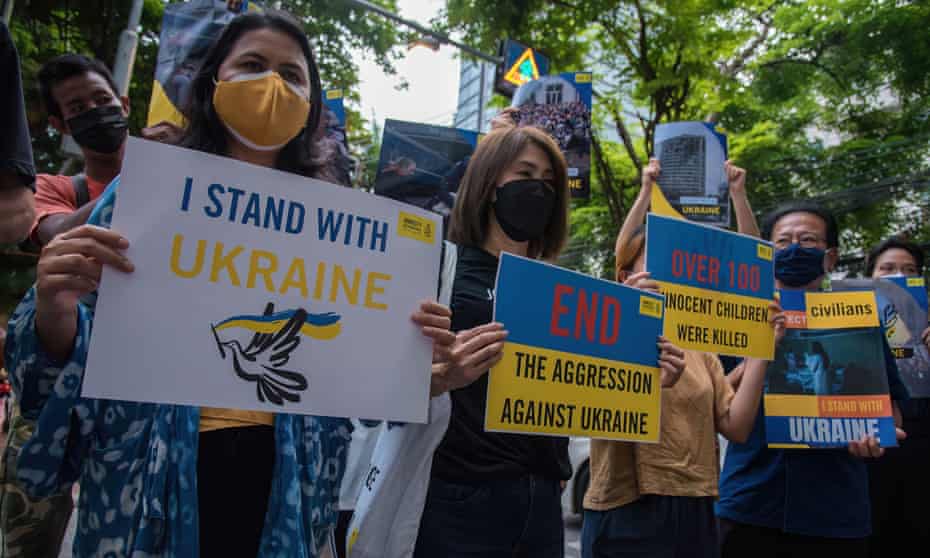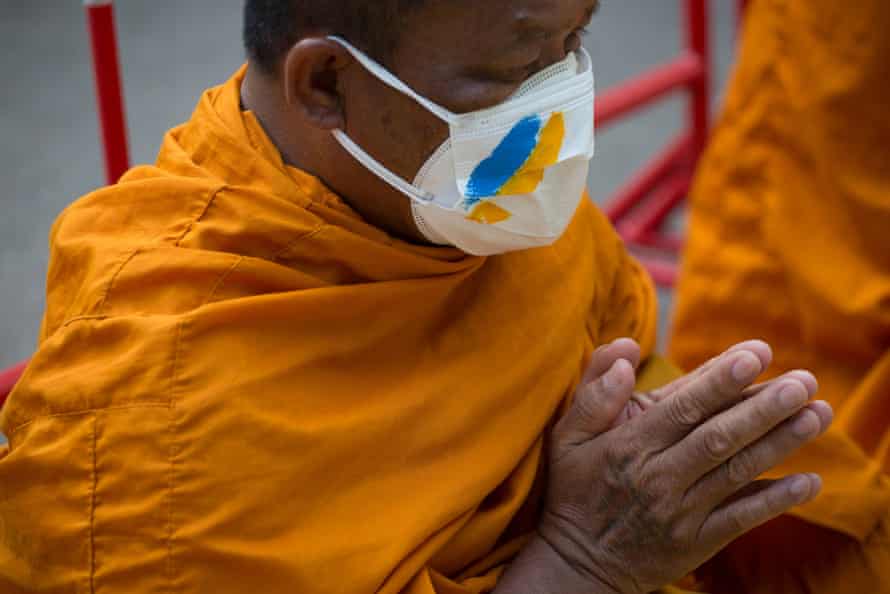
In March, as the devastating war in Ukraine raged, Russian diplomats in Bangkok sat down for a meeting with the leadership of Thailand's military-owned TV station.
They had met, a statement by TV Channel 5 said, to discuss ways to enhance "cooperation in exchanging news and information". Russian officials were ready to support efforts to tackle fake news, and to verify information. A week later, the TV channel's boss abruptly resigned.
Across the world, battles are being fought over how the war in Ukraine is discussed and presented. In Thailand, the tussle over narratives has played out not just on TV channels, but also on social media and at opposing press briefings and rival statements organised by the Russian and Ukrainian embassies.
The Thai prime minister, Prayuth Chan-ocha, a former army general who first came to power in a coup, denied he had intervened in Channel 5's case or requested the channel stop reporting on the war – but has said excessive commentary should be avoided. Thailand, whose foreign policy has traditionally been likened to bamboo "bending with the wind", has maintained that it has a neutral stance on the war. It did, however, vote in favour of a UN resolution that condemned Russia.
Reaction within Thailand to Russia's invasion of Ukraine has often reflected the country's highly polarised politics. "[People] tend to think of the Ukraine war in terms of their perception towards democracy or authoritarianism," said Kitti Prasirtsuk, professor in international relations at Thammasat University. Prominent conservatives have expressed support or sympathy for Russia, while many young people, who have protested for political and monarchy reform at home, have rallied behind Ukraine.

Conservatives describe Russia as a longstanding friend, referring to how, more than 100 years ago, Tsar Nicholas II helped Siam resist colonialist pressure. Vladimir Putin is applauded for his strong style of governance, which has been admiringly likened to that of Chinese President Xi Jinping. "They think Xi Jinping led China to be a successful economy, and that he is very decisive in taking measures against corruption," Kitti said. "Conservative people are fond of that kind of leadership."
Antagonism towards the US, which some establishment figures accuse of stoking Thailand's recent youth-led protests, has also shaped conservative responses to the conflict, he added.
While outright support for Russia's invasion is a minority view, commentary that is favourable to Putin has circulated widely on social media chat groups, especially among older generations, said Kitti. "In my LINE group every day people send Facebook links," he said, referring to a popular chat app.
Among younger generations, there is, however, a strong desire to stand by Ukrainians. "When you learn to fight dictatorship it is not hard that you will understand people who are fighting the same causes elsewhere," said Netiwit Chotiphatphaisal, a Thai student activist. Some have even expressed interest in travelling to Ukraine to support its people, though it is not clear if any have done so.
The Ukrainian and Russian embassies in Bangkok have clashed over the prospect of Thais volunteering in the war. When Ukrainian officials issued a statement calling for people to join their country's fight – and news outlets reported that young people were intending to apply – Russian diplomats directly criticised the embassy, warning the best-case scenario for those who do so is "detention and prosecution".

An awkward balancing act
Both liberal and more conservative voices in Thailand have criticised the west for its role in the crisis.
Kasit Piromya, a former Thai foreign minister under Abhisit Vejjajiva, and once a leader of the yellow shirts, said the US had, for a long time, failed to take Russia's security concerns seriously. Both Joe Biden and Ukraine should have entered parallel talks with Putin at an earlier stage, said Kasit, who is also a former ambassador to Russia.
"With so much backing from Biden, cajoling and so on, then the Ukrainians became more confrontational. But at the end of the day, the country that suffers is Ukraine," he said. "They were doing this more or less as a proxy or on behalf of the United States, and the western Europeans and so on."
Commentators aligned with Thailand's pro-democracy movement have clashed over how Thailand should respond. Some have questioned the accuracy of information provided by western media and suggested that it is better for Thailand not to pick a side. Piyabutr Saengkanokkul, founder of Future Forward, a progressive party that has riled the establishment and has since been dissolved by the constitutional court, said some commentary about the war sounded as if it were based on a Hollywood movie plot where Russia is "a forever bad guy". He later clarified that he condemned Russia's invasion, calling it a violation of international law.
The Thai government faces an awkward balancing act. Russia is not a key trading partner, but, post-Covid, Russians have accounted for one of the largest groups of tourists arriving in Thailand. Later this year Thailand will chair the Apec summit, where 21 nations including Russia, the US and China with gather. Prayuth said all news media should avoid giving too much analysis. Doing so, he said, "will cause problems to the overall image of our country".
Russia's invasion of Ukraine has abruptly transformed the world. Millions have already fled. A new Iron Curtain is grinding into place. An economic war deepens as the military conflict escalates and civilian casualties rise.


Inga kommentarer:
Skicka en kommentar